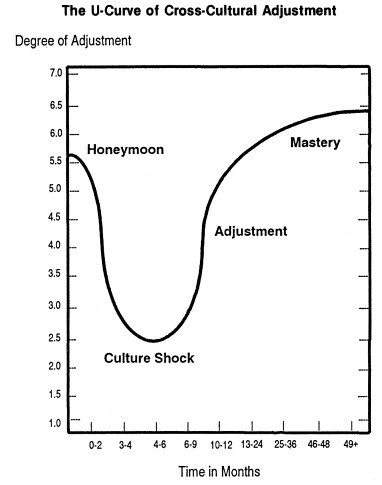Intercultural Communication: Cultural Adaptation and Intercultural Sensitivity
Lead-in
Take a couple of minutes to answer the questions.
Think of the time(s) you have spent in another country. How did you feel while you were there? Did you feel you were undergoing different stages?
Which of these words would you use to describe your emotional state or states?
anxiety
comfort
curiosity
depression
excitement
hopefulness
According to researchers, it is common to undergo different stages of adapting to a new culture. The process is far from being
Other factors which influence this process are your age, if you are alone or accompanied by your family, if this is your first stay in another culture, the support you receive from your hosts, your own level of intercultural competence, the attitude of your peers and seniors, etc.
Before moving on to the Presentation of
Cultural adaptation

Stage | What you feel |
|---|---|
Honeymoon | Usually very positive feelings for the local people, the food, the surroundings, etc. Excitement, curiosity, willingness to immerse in the new culture |
Culture shock | Psychological and physical disorientation Anxiety, frustration, even anger Fear and insecurity, homesickness You are overly sensitive to differences |
Adjustment | Gradually the negative emotions are overcome Hopefulness and readiness to develop new patterns of life, more suited to the new surroundings |
Mastery | A feeling of being comfortable in both your home and the new culture |
The Developmental Model of Intercultural Sensitivity
This is another approach to thinking about intercultural experiences, developed by Milton Bennet. He has divided the process into two very distinct cycles. Over the first one, it is difficult to take off your perceptual glasses which make you believe that “My ways are the only ways”. Over the second one, you are gradually accepting the fact that “My ways and your ways are equally true and lead to the same place.”
First ‘cycle’ (Ethnocentric)
Denial - one's own culture is experienced as the only real one. People
Defense - one's own culture (or an adopted culture) is experienced as the only good one. The world is organized into "us and them". People at Defense are threatened by cultural difference, so they tend to be highly critical of other cultures.
Minimization - elements of one's own cultural worldview are experienced as universal. People at Minimization expect similarities, and they may become insistent about correcting others' behavior to match their expectations.
Second ‘cycle’ (
Acceptance - one's own culture is experienced as just one of a number of equally complex worldviews. People at Acceptance are curious about and respectful
Adaptation - the experience of another culture yields perception and behavior appropriate to that culture. People at Adaptation are able to look at the world "through different eyes" and may intentionally change their behavior to communicate more effectively in another culture.
Integration -
Based on
- Bennett, M. (1986). A developmental approach to training for intercultural sensitivity. International Journal of Intercultural Relations 10, no.2: 179-95.
- Bennett, M. (2004). Becoming interculturally competent. In J. Wurzel (Ed.), Toward multiculturalism: A reader in multicultural education (2nd ed., pp. 62-77). Newton, MA: Intercultural Resource
- Bennett, M. (2013). Basic concepts of intercultural communication: Paradigms, principles, & practices. Boston: Intercultural Press.
Hands-on Tasks and Reflection
Think about your current stay abroad (or the one you are planning to take). Watch the videos telling the stories of researchers who have successfully adapted to their new environment again.
Note down their advice. Then make a plan of the next steps you can take to make your own process of adaptation easier and
